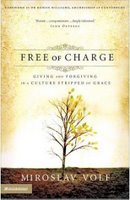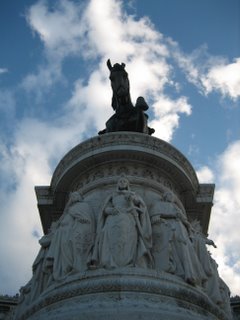 Admiring (cont)
Admiring (cont)
This is a summary of the second half of Oliver O'Donovan's second lecture in the 2007 New College Lectures Morally Awake? Admiration and resolving in the light of Christian faith. This second lecture is on Admiring.
-----
The feeling of dread arises when we reach the limits of our knowledge. We fear the unknown. This is most clearly seen in children, who, in order to praise one thing as good, often need to demonise alternatives. We treat our dreads as though they were as real as our loves. We can love evil by refusing the adopt the self-reflective position, becoming curved in upon ourselves, according to Luther's definition of sin:
incurvatus in se. We then divide the world in two: good and evil. This creates a negative sense of "world" to go alongside the positive use assumed throughout these lectures so far. This negative world is a world our self-enclosure pitched in opposition to the real world.*
*Perhaps I missed a crucial step in this paragraph. This is one section I'd like to revisit when the recordings and full text of the lectures appears on the New College website.
Repentence is thus the progress from unreflective knowledge to reflective knowledge. In coming to know ourselves we come to know (reflectively) our unreflectiveness. Conversion is the beginning of the perfection of love, which casts out dread, according to St John (1 John 4.8). Augustine spoke of learning to love the self, by this he meant that the love of God and neighbour is a self-aware love; we do not come to love God and neighbour absent-mindedly. These loves
are not in competition. We do not love ourselves
as much as we love God, for we are to love him with our whole being, and there is nothing left over after this love. Self-love is not self-interest or protectiveness, yet nor can we rule the self out of perfect love. Reflective self-love is the opposite of unreflective self-absorption in which we are left at the centre of our own universe without a purchase on the reality of others.
Love must be
ordered. There are many good things in the world; how can we love a pluriform world? We need an ordered set of relations as we participate in the moral order. Our admiration has to be structured, rather than simply saying "wow" to each new thing. We must learn to value most what is most valuable. Our love must learn nuances, similarities, contrasts, causes and effects. An ordered knowledge of an ordered world will lead to an ordered knowledge of self. We come to learn about our eyes as we use them to observe the world. We discover that there are others like myself, who see and love. The neighbour is always the self's companion; indeed, it is through the neighbour that we come to awareness of the self: I am other people's other people - vulnerable, capable of disappearing to them as they are to me.
Returning (once again) to Augustine (a frequent touchstone throughout this lecture), in his
De Doctrina Christiana he distinguishes between loving and using in order to create a hierarchy in which God is the supreme good to be loved. The
first lecture spoke of wakefulness to the world, the self and to time, but why not to God? Why isn't God a fourth thing alongside the others? Each of the other three are not fully grasped except in relation to God. God is the source and end of our awakening. Yet God is not the direct object of our attention, except through the incarnation and prophetic utterance of the Spirit. How can God be the source of our admiration?
To answer this question, let us focus on the experience of
gratitude. I admit that what is good, is good
for me. I belong to this world and am indebted to its goodness. Gratefulness makes our knowledge of the world come alive. Yet it has also seen that good is a
communication: it is
for me, but
from whom? Who is the source? Once we have caught ourselves being grateful, we are driven to address the supreme good. It is possible to enjoy this or that good without thinking of the source in the supreme good, though it is not possible to do so throughtfully. We can only grasp God's goodness is relation to created (and redeemed) goods. Love thus follows a path from the world through the self and neighbour to God.
Goodness for me is an event, a history. It occurs in time. This doesn't mean that change is all that matters. The goodness of God is not simply something past and achieved, it is also a promise. In admiring, we learn to anticipate God's future goodness. It is as we are placed before a given good that is open to perfection that we begin to
hope. Hope holds before us a future that is our good. Opens a space in which we may act. Our ultimate hope, extended to an absolute future means we can intend to our immediate future.*
*Again, I wasn't sure I followed this section, but I think O'Donovan was making a similar point to Barth's comment about little and big hopes. He included a quote from Augustine and extending and intending, which I missed. There is more on hope in the third lecture.
Virtue is a form of goodness realised in others around us, a glimpse of what human action is given to be. Virtue is in the first place in the third person and visible, rather than internal. It is not a law, ideal or command. The virtues are
not to be imitated, but to be loved. They are the evidence or seal on God's promise for our lives, communicating a promise of the perfection we lack. Virtue is a kind of goodness, not rightness.
-----
Question time included queries about the Word of God (O'Donovan spoke with great care of Christ, the Scriptures and Christian proclamation), more on his closing comments about virtues, the reality of evil (O'Donovan repeated the view of the fathers that Satan is perfectly good insofar as he exists. The problem with Satan is not what is there, but what is not there: love. There is a hole at the centre of Satan. Living from fear is living out Satanic emptiness [making interesting links with
Voldemort]. When we confront the Other, do we highlight what is not known and centre on that? Satan asks us to worship a lack. A further question asked then if evil only existed in the mind, to which he replied that evil is an event, a doing, rather than a being. Satan's evil is not in his being, but in his rebellion. In our sin we assert ourselves against reality), the difficulty of portraying goodness in art due to our cynicism (a protective mechanism, which believers can dispense with in order to be expert admirers), and on eschatology. This final question took a few attempts to articulate, until finally the questioner came right out and asked "Are you pre-, post- or amillennialist? What is your eschatology?". There was an audible dropping of the collective penny and we turned to hear O'Donovan's reply. "I have no eschatology," he said, "apart from that of the New Testament." He refused to systematise or sequentialise the scriptural images of what he called "the absolute future", though confessed his orthodox belief in
the return of Christ, the judgement of God and the resurrection of the dead.
All three nights were well attended and had excellent, albeit fairly brief, question times. Everyone I spoke with agreed that this second lecture was the hardest to follow. As I heard someone say on the third night, "I followed him down all the streets, but I missed some of the corners." And I think my note-taking reflects that: I got many/most of his assertions, but didn't always grasp the logical links and moves between them. If these summaries feel jerky, that is why.
Ten points for providing a link to a very similar photo on this blog, taken just a few metres further back.
Series: I; IIa; IIb; IIIa; IIIb.




















